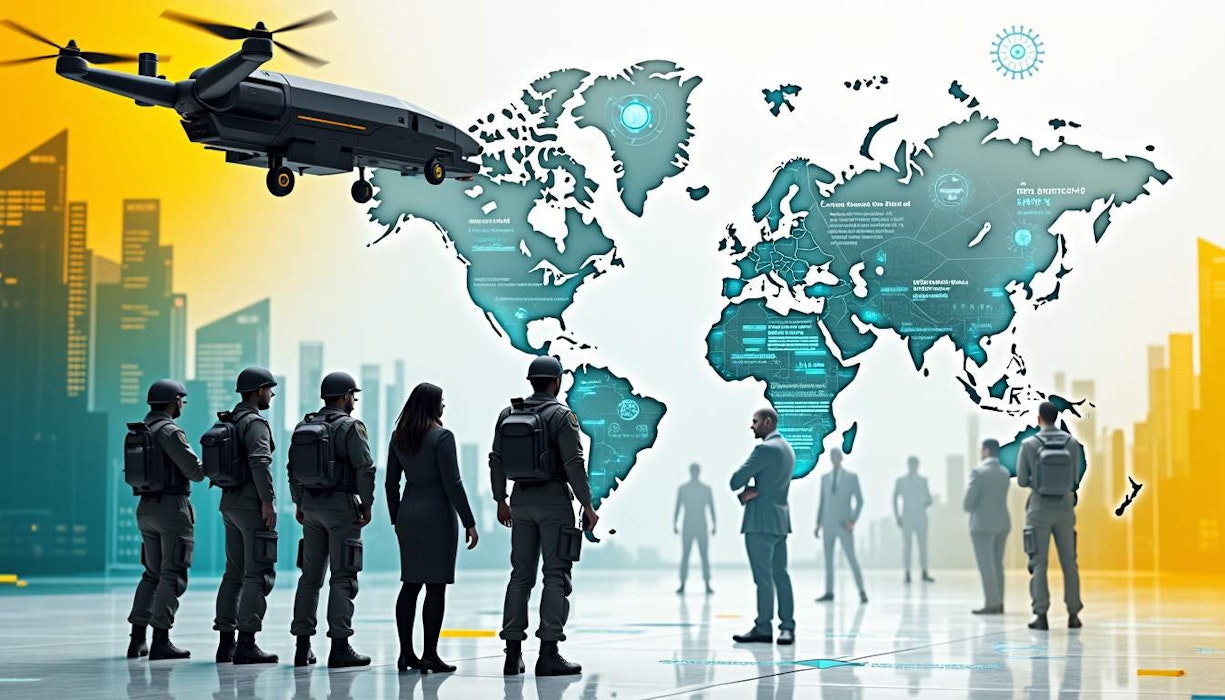What role does AI play today in military operations?
AI has emerged as a crucial player in today's military operations. It enhances surveillance capabilities, refines threat detection, and aids military strategists in their decision-making processes. The technology improves intelligence collection, integrates with cybersecurity measures to counteract cyberattacks, and even manages autonomous weapon systems. However, this dual-edged sword presents operational advantages alongside risks such as weaponization and geopolitical destabilization.
How is Ukraine leveraging AI in its conflict with Russia?
Ukraine stands out for its innovative use of AI in the ongoing conflict with Russia. A non-profit Ukrainian digital system called OCHI is responsible for integrating and analyzing video feeds from more than 15,000 drone crews. Since 2022, this system has amassed 2 million hours of battlefield video, providing a wealth of data for AI to learn from.
The footage collected trains AI models to understand combat tactics, identify targets, and evaluate the effectiveness of weapon systems. Thousands of drones already employ AI systems to autonomously navigate towards targets without human intervention. Furthermore, Ukrainian firms are developing drone swarms, enabling a computer system to coordinate commands for a cloud of interconnected drones.
What ethical dilemmas accompany the use of AI in warfare?
The incorporation of AI into warfare brings forth substantial ethical dilemmas. Autonomous weapons systems (AWS) are capable of operating devoid of human oversight, which raises questions about accountability and the potential for civilian harm. Critics express concern that AWS, lacking human judgment and accountability, could lead to unintended consequences and escalate conflicts.
Moreover, the ethical considerations touch upon the principles of Just War Theory, which emphasizes the necessity of distinguishing between combatants and non-combatants and maintaining proportionality in harming civilians. The risk of AWS inflicting increased civilian casualties, along with the challenge of ensuring accountability and transparency, poses significant ethical concerns that demand attention through international regulatory frameworks.
How does AI affect global security and geopolitical stability?
AI's integration into military operations has profound implications for global security and geopolitical stability. On one hand, AI enhances surveillance, accelerates threat detection and response times, and supports military strategists in their decision-making. Its capabilities improve intelligence collection and analysis, while also providing cybersecurity enhancements to combat cyberattacks.
Nevertheless, AI presents serious risks, including the potential for weaponization, the emergence of autonomous weaponry, and the destabilization of geopolitical balances. The interplay between AI and strategic stability is not merely technical but also shaped by policymakers' beliefs and perceptions. While AI enhances data processing, object recognition, and early warning systems, it simultaneously introduces risks like uncertainty, inadvertent escalation, and a potential shift in nuclear equilibrium.
What are the benefits and dangers of using AI in military settings?
AI brings numerous advantages to military contexts, such as improved operational efficiency, enhanced surveillance and threat detection, and better decision-making capabilities. However, these benefits are accompanied by significant dangers. The potential for AI to be weaponized and deployed in autonomous weapon systems raises concerns about accountability and the ethics of entrusting life and death decisions to machines.
Moreover, AI's usage in military operations may lead to unintended conflict escalation and the destabilization of geopolitical balances. The lack of robust international regulations governing AI development exacerbates these risks. Addressing these concerns necessitates careful attention to policymakers' perceptions and the establishment of robust international regulations and confidence-building measures.
How does data collection by AI complicate privacy and international laws?
The battlefield data collected by AI systems poses considerable challenges to both privacy and international laws. AI complicates operational coordination and interoperability among alliance members due to varying technological capabilities and reluctance to share sensitive data. This unequal distribution of technology and the need to share data can hinder burden-sharing and operational effectiveness.
In a military context, it is essential to ensure that the collection and processing of battlefield data uphold strict privacy standards. The absence of uniform nationwide regulations and the differing global regulatory landscapes further complicate these issues, necessitating a unified transatlantic regulatory approach to protect privacy. To safeguard profiling data in a military environment, robust measures such as anonymization, pseudonymisation, and technical and organizational security controls are needed.
What consequences could arise from an AI arms race in autonomous weaponry?
An AI-driven arms race in autonomous weaponry may result in heightened tensions, increased conflict risks, and significant challenges to international law and governance. The advancement and deployment of AI in military applications could spark new arms races, particularly in volatile regions like the Middle East, exacerbating existing tensions and conflicts.
The involvement of major powers like the US, China, and Russia in the AI arms race could further escalate competition, resembling the Cold War-era arms races. This dynamic could jeopardize global peace and stability. The lack of a comprehensive global governance framework for military AI leaves powerful technologies unchecked, amplifying risks to international peace and security, escalating arms proliferation, and challenging international law.
In conclusion, AI offers substantial benefits in military contexts, but it also presents significant risks that require careful management. The development of robust international regulations and cooperative frameworks is crucial to harnessing AI's advantages while mitigating its risks to global security and geopolitical equilibrium.
